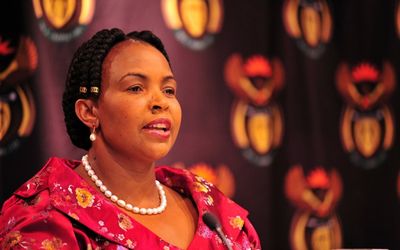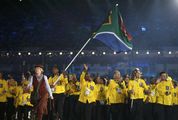SA now far from a leader on sexual rights
by Eduard Jordaan,
2014-09-05 05:46:15.0
DURING the March 2011 session of the United Nations (UN) Human Rights Council, SA tabled a draft resolution to define sexual orientation and to clarify the relationship of this term to international human rights law. The aim of the resolution was sinister — to prevent the discussion of anything to do with sexual orientation throughout the UN until the term "sexual orientation" had been defined. Such a process would take years.
SA’s initial plan was to present the resolution on behalf of the African Group. However, African states decided it was better not to even raise the issue and so withdrew their support. SA tabled the resolution regardless. Western and Latin American states were livid at SA’s regressive resolution. SA withdrew its draft.
Three months later, at the June 2011 session of the UN council, SA did an about-turn and led it to adopt Resolution 17/19, a progressive resolution on sexual orientation and gender identity, the first such UN resolution. In its wake, Jerry Matjila, who was SA’s ambassador in Geneva at the time and is now director-general of the Department of International Relations and Co-operation, revealed that SA’s diplomats had been told to treat the Bill of Rights as "their bible". In February, Deputy Justice Minister John Jeffery, declared SA "a world leader" on lesbian, gay, bisexual, transgender and intersex (LGBTI) rights. Unfortunately, the facts suggest otherwise.
Resolution 17/19 requested a report from the UN Commissioner for Human Rights. In November 2011, she published a report describing widespread violence and discrimination on the basis of people’s sexual orientation. Other states looked to SA for leadership on this matter.
Stung by criticism from African and Islamic states, SA announced in June 2012 that it wanted to proceed slowly and inclusively. The way to do this, it said, was to hold a workshop in each of the five regions of the UN. By April last year, all the UN regions except Africa had held a workshop. At the same time, pressure for a resolution on sexual orientation was building. As the commissioner’s office pointed out, a resolution was necessary to mandate the documentation of human rights violations against people because of their sexual orientation.
However, SA kept insisting there could be no follow-up resolution until Africa had held its workshop. Yet SA repeatedly failed to deliver the workshop.
In March 2014, in her speech to the UN council, International Relations and Co-operation Minister Maite Nkoana-Mashabane did not mention the workshop, although the original version of her speech contained a commitment to hold it during the first half of this year.
By now, western and Latin American states had accepted that SA was not going to take the issue forward. Considering that SA’s support for the sexual orientation issue in the council had damaged its relations with the rest of the continent, SA’s retreat was understandable. What was unforgivable, however, was its behaviour at the council’s June 2014 session.
Egypt presented a draft resolution, co-sponsored by Uganda and Russia, among others, on the "protection of the family". The resolution asserts that the "family is the natural and fundamental group unit of society and is entitled to protection by society and the state". Although the resolution did not define "family", the suspicion was always that it was based around a married man and woman.
This suspicion was confirmed by the way opponents of LGBTI rights dealt with a proposed amendment to remind everyone "various forms of the family exist". Before such alternative forms of family could be discussed, Russia proposed ending the debate. Its motion was adopted 26-14. SA voted with Russia, and also voted for the family protection resolution, which was adopted 22-20, with western and Latin American states voting against.
According to Human Rights Watch, SA’s vote was an "insidious attempt to undermine the universality of human rights" and contradicts the commitments enshrined in our constitution. Indeed, but it is about more than that. Before Nelson Mandela became president, he wrote that "human rights will be the light" that guides SA’s foreign policy. At the UN Human Rights Council, SA has failed to live up to this commitment.
The council’s next session starts on Monday. A new, progressive resolution on sexual orientation rights is long overdue. It is time for SA to act the way Mandela wanted us to act.
• Jordaan is political science assistant professor at Singapore Management University’s School of Social Sciences.

International Relations and Co-operation Minister Maite Nkoana-Mashabane. Picture: GCIS
DURING the March 2011 session of the United Nations (UN) Human Rights Council, SA tabled a draft resolution to define sexual orientation and to clarify the relationship of this term to international human rights law. The aim of the resolution was sinister — to prevent the discussion of anything to do with sexual orientation throughout the UN until the term "sexual orientation" had been defined. Such a process would take years.
SA’s initial plan was to present the resolution on behalf of the African Group. However, African states decided it was better not to even raise the issue and so withdrew their support. SA tabled the resolution regardless. Western and Latin American states were livid at SA’s regressive resolution. SA withdrew its draft.
Three months later, at the June 2011 session of the UN council, SA did an about-turn and led it to adopt Resolution 17/19, a progressive resolution on sexual orientation and gender identity, the first such UN resolution. In its wake, Jerry Matjila, who was SA’s ambassador in Geneva at the time and is now director-general of the Department of International Relations and Co-operation, revealed that SA’s diplomats had been told to treat the Bill of Rights as "their bible". In February, Deputy Justice Minister John Jeffery, declared SA "a world leader" on lesbian, gay, bisexual, transgender and intersex (LGBTI) rights. Unfortunately, the facts suggest otherwise.
Resolution 17/19 requested a report from the UN Commissioner for Human Rights. In November 2011, she published a report describing widespread violence and discrimination on the basis of people’s sexual orientation. Other states looked to SA for leadership on this matter.
Stung by criticism from African and Islamic states, SA announced in June 2012 that it wanted to proceed slowly and inclusively. The way to do this, it said, was to hold a workshop in each of the five regions of the UN. By April last year, all the UN regions except Africa had held a workshop. At the same time, pressure for a resolution on sexual orientation was building. As the commissioner’s office pointed out, a resolution was necessary to mandate the documentation of human rights violations against people because of their sexual orientation.
However, SA kept insisting there could be no follow-up resolution until Africa had held its workshop. Yet SA repeatedly failed to deliver the workshop.
In March 2014, in her speech to the UN council, International Relations and Co-operation Minister Maite Nkoana-Mashabane did not mention the workshop, although the original version of her speech contained a commitment to hold it during the first half of this year.
By now, western and Latin American states had accepted that SA was not going to take the issue forward. Considering that SA’s support for the sexual orientation issue in the council had damaged its relations with the rest of the continent, SA’s retreat was understandable. What was unforgivable, however, was its behaviour at the council’s June 2014 session.
Egypt presented a draft resolution, co-sponsored by Uganda and Russia, among others, on the "protection of the family". The resolution asserts that the "family is the natural and fundamental group unit of society and is entitled to protection by society and the state". Although the resolution did not define "family", the suspicion was always that it was based around a married man and woman.
This suspicion was confirmed by the way opponents of LGBTI rights dealt with a proposed amendment to remind everyone "various forms of the family exist". Before such alternative forms of family could be discussed, Russia proposed ending the debate. Its motion was adopted 26-14. SA voted with Russia, and also voted for the family protection resolution, which was adopted 22-20, with western and Latin American states voting against.
According to Human Rights Watch, SA’s vote was an "insidious attempt to undermine the universality of human rights" and contradicts the commitments enshrined in our constitution. Indeed, but it is about more than that. Before Nelson Mandela became president, he wrote that "human rights will be the light" that guides SA’s foreign policy. At the UN Human Rights Council, SA has failed to live up to this commitment.
The council’s next session starts on Monday. A new, progressive resolution on sexual orientation rights is long overdue. It is time for SA to act the way Mandela wanted us to act.
• Jordaan is political science assistant professor at Singapore Management University’s School of Social Sciences.



























Post a comment